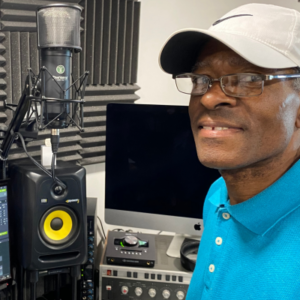Bob Babbitt was probably the most significant of the arrivals at Motown in the later years. With James Jamerson becoming increasingly unreliable due to his addiction problems, Berry Gordy need a bass player who had the talent and the technique to replicate what Jamerson usually played. Given that Jamerson is generally regarded as a genius, often cited as the best-ever bassist in popular music, Gordy knew that it would not be easy to recruit a new session man. Luckily, he found Bob Babbitt.
Babbitt was born in 1937 in Pittsburgh, Pennsylvania. His name was actually Robert Andrew Kreinar. His parents were Hungarian. He started to learn the double bass as a youngster and went on to study classical music, although he has said that the Hungarian gypsy music that he heard at home influenced him more. He also enjoyed the Soul and R&B music that he heard on the radio and found opportunities to play in local clubs. He was hoping to take up a place at the University of Pittsburgh, but had to alter his plans when his father died suddenly. Instead of university, he now had to find work. Thanks to an uncle who secured him a job in the construction industry in Detroit, he came to Michigan in the late fifties.
Fortunately there were plenty of opportunities for him to play music in the city. He chose the stage name Babbitt and joined the Royaltones, which led to an invitation to play in Del Shannon’s touring band. After that, he did some sessions at Golden World Studios with Edwin Starr, which gave him the opportunity to play alongside James Jamerson, who often did moonlighting sessions there. In 1966, he joined Stevie Wonder’s touring band, following which he was in demand again at Golden World and also at United Sound and Tera Shirma Studios in Detroit. He built up a solid reputation amongst musicians in Detroit with his bass playing on hits including “Agent Double-O-Soul” for Edwin Starr, “I Just Wanna Testify” for the Parliaments, and “Cool Jerk” for the Capitols.

The Funk Brothers with Jeff Albert (far right) 2006
Photo: Jeff Albert, Mandeville, LA (Wikimedia Commons)
Bob Babbitt is second from leftj
In 1969, he was a member of the Lyman Woodard Trio, with Woodard and Andrew Smith, which then became the Dennis Coffey Trio, and then, in the same year, he formed Scorpion, with Ray Monette, Andrew Smith, and Mike Campbell. Just before his first stint in Studio A, Holland, Dozier, Holland invited him to Tower Studio to record Freda Payne’s “Band of Gold”, alongside a band loaded with Funk Brothers: Eddie Willis, Ray Monette, Ray Parker, Earl Van Dyke, Uriel Jones, Jack Ashford, and Dennis Coffey (who played electric sitar). No wonder it was a hit!
His first real booking at Motown came in 1970, when he was hired to play on the recording sessions for Stevie Wonder’s cover of the Beatles song “We Can Work It Out” and for “Signed, Sealed, Delivered”, which were both included on the album “Signed, Sealed & Delivered”. Jamerson played bass on the rest of the tracks.
After that, it became easier to pick up studio work at Motown, especially as Motown’s number one bass player (James Jamerson) was succumbing more and more to his alcohol addiction. Babbitt got on well with Jamerson and began imitating his playing style, in order to maintain the familiar Motown sound.
His Fender Precision Bass can be heard on over two hundred Motown recordings, as he built excellent partnerships with drummers Andrew Smith, Richard “Pistol” Allen and Uriel Jones between 1970 and 1972. Babbitt’s most significant contribution came just before Berry Gordy moved Motown to Los Angeles, when he was asked to join the session band for the recording of Marvin Gaye’s “What’s Goin’ On” album. Marvin Gaye and the producer of the album, Dave Van DePitte, wanted to move away from the usual highly structured approach of Motown. They wanted more spontaneity and more creativity from the band, and for that they wanted Babbitt, as well as James Jamerson. Jamerson played on the first five tracks, and Babbitt played on the last four.
Soon after, when Motown moved to the West Coast and the Funk Brothers were disbanded, Babbitt chose, along with Andrew Smith, to work in New York and Philadelphia, where he played on sessions with Gladys Knight (“Midnight Train To Georgia”) and the Spinners. You can hear Babbitt playing the unique and highly innovative bass line on the million-selling 1976 single “The Rubberband Man”, which was arranged and produced by Thom Bell and performed by the Detroit Spinners. In 1986 Babbitt moved to Nashville and widened the scope of his musical contributions, recording with Brenda Lee, Robert Palmer and Joan Baez amongst others. His list of credits is amazing, an indication of his talent and versatility. Over the course of his career in the music industry, he played on over two hundred top-40 hits. On his website (www.bobbabbitt.com) Babbitt has given an insight into his playing:
“Looking back, I think the tracks where the real me came out are ‘Touch Me in the Morning’ (by Diana Ross), ‘Then Came You’ (by Dionne Warwick & the Spinners), ‘Mama Can’t Buy You Love’ (by Elton John), ‘Midnight Train to Georgia’ (by Gladys Knight & the Pips), and Dennis Coffey’s ‘Scorpio’, which had a 90-second bass solo that’s all me.”
Just five examples but they encapsulate his mastery of the electric bass. And if you think the Gladys Knight song has a strong flavour of Motown, you would be right. In a November 1998 interview reported on the bassplayer site, Babbitt explained why: “That bassline came out of the James Jamerson tradition. Gladys is from Detroit, so that’s what she wanted. Me and the rest of the studio bassists all had to come up with parts in Jamerson’s style, and rightly so; he was the original.”
In his early years in Detroit, Babbitt played a ’60 Jazz bass. He then switched to a red Precision ’63 or ’64, which was stolen a few years later. By the time he got to Studio A, he had a CBS Precision bass with LaBella flatwound strings, which he used for many years.
In 2004 Babbitt was chosen to receive a Grammy Lifetime Achievement Award. In 2010, he was invited by Phil Collins, along with Eddie Willis and Ray Monette, to join the session band for the recording of Collins’ tribute album to music of Motown, “Going Back”, which was released by Atlantic Records in September. The three Motown session men also joined the subsequent tour. It was a fitting tribute to all three.
Just two years later, Babbitt died in 2012, aged seven-four. He was one of the greatest session musicians of all time.

















